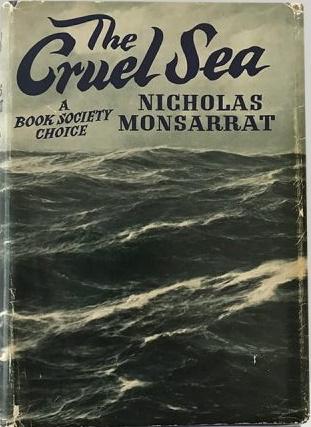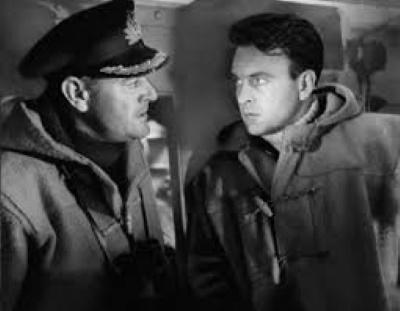Book Review by Mary P: Our theme for the month was naval fiction, and I decided to read The Cruel Sea which when I looked for a copy of the book was said to be “ a classic “
 Cover of the first edition.
Cover of the first edition.
The book is divided into 7 parts, each one covering a year of the War in the Atlantic. Setting the scene in the introduction we are told:-
“This is the story – the long and true story – of one ocean, two ships, and about a hundred and fifty men…..But the men are the stars of this story. The only heroines are the ships: and the only villain the cruel sea itself.”
Part 1 is entitled 1939 Learning, and we are introduced to the crew allocated to the corvette Compass Rose, getting ready to escort convoys of merchant shipping across the Atlantic. Lieutenant Commander Ericson, too young for WW1 and too old for WW2, has been brought out of retirement to captain the ship. His crew prove to be a mixture of experience. Two fellow officers have come straight from a 5 week training course and were a journalist and bank clerk in civilian life. Gradually they all begin to work as a team and learn the necessary skills.
Part 2 takes us on to 1940 and Compass Rose beginning the task of escorting convoys. Escorts are redeployed for the Dunkirk evacuation leading to convoys being less secure and in just three months 200 boats are sunk. Compass Rose is under attack for the first time, and rescues casualties from the sea. The crew are based in Liverpool and several move their families so that they can join them when they are on leave. Ericson struggles with the contrast between life on board and at home, feeling that it is:
“ a softer world which might destroy his resolute spirit….relaxation seemed a form of treason”.
Part 3 takes us to 1941. Convoys continue to lose ships in large numbers to the better equipped German navy and the increase in U boat numbers. Ericson is injured and Lockhart takes over command of the ship. He grows in confidence as his fellow officer Ferraby is adversely affected by witnessing death and injury. We follow the crew when they are on leave during the refit of Compass Rose. Ericson spends time with his son who is a merchant seaman, and is able to talk about his war, and his fears in a way he is unable to do with his wife. Now complete with radar Compass Rose escorts a convoy to Gibraltar. 14 ships are lost out of 21 during 8 days. When they go to rescue survivors from one sinking, the radar picks up a possible U boat in the water, and Ericson makes the decision to attack it knowing that this will kill those remaining in the water. This decision haunts him, and leads to a change form the avuncular style of leadership he has so far adopted to a tougher and colder one. They sink a U boat and Ericson gets close to shooting the German captain when he is taken prisoner.
Part 4 moves on to 1943. They continue to lose many ships as U boat numbers increase. The crew witness the horror of dealing with the dead and the maimed. They encounter several grisly sights, 9 dead men reduced to skeletons in the water, and survivors swimming towards them from a oil tanker on fire, only to be engulfed by the burning oil rushing towards them as they desperately try to save themselves. Lockhart deals with a casualty so badly burned that his skin comes away as he tries to treat him, and he longs for him to die to be released from his pain. Finally luck runs out for Compass Rose and she sinks off Iceland with only 11 survivors.
Part 5 1943 sees Ericson and Lockhart, who turns down promotion to stay with the captain, allocated to a frigate Saltash and they are now based on the Clyde. The war is beginning to change as the U boats are losing their advantage. Ericson now the stern commander of the whole convoy feels there is no longer any room for sentiment , and is impatient that the war is finally won. On a convoy to Russia they encounter a severe storm surviving to sink a U boat after an exhausting chase when Ericson is at the very edge with exhaustion. Lockhart gets involved with Julie, a Wren, and he finally lets his guard down now, convinced. that it is possible to fight the war and have an emotionally committed relationship. Rather oddly Nelson is referred to in order to suggest the change in his point of view.
Part 6 1944 finds Ericson at Buckingham Palace to receive the DSO and Saltash in New York for a refit, where Lockhart gets the news that Julie has been drowned in an accident. Saltash is sent to guard the entrance to the Channel during the D day landings.
Part 7 1945 sees the surrender of three U boats to Saltash, and they are escorted into Loch Ewe, marking the end of the war for the frigate and for the crew.
Nicholas Montsarrat served on corvettes during WW2 and this brings authenticity to his account of the War in the Atlantic. He describes how when escorting convoys often very little happens day after day and then suddenly it is all hands on deck when the weather changes, or an attack begins.
What makes this not just an action novel is his ability to create characters that engage the reader’s interest. It is hard not to see Ericson as the Jack Hawkins figure from the 1953 film of the book. We see the crew at work and at play, and how the war touches every aspect of their lives. The war experienced by men and women is very different, apart from Julie, who is employed by the navy. Women are portrayed as loyal wives, unfaithful wives, sex workers, etc. and little attempt is made to develop the affect of the war on their lives. They are bit players to the central role of the sailors. The crew of the Compass Rose is described as a family, and the friendship between Ericson and Lockhart is almost like fathers and son.
The author makes no attempt to glorify war. He clearly has a deep respect for the men who participated in the War in the Atlantic, and he does not spare the reader from what was involved in winning it.
I have to admit that my heart sank when I saw the theme for reading this month. Naval fiction and war novels are not top of my list of books to read. However having begun the book with no knowledge of this theater of war, I finished it feeling that it had taught me a lot. My only criticism would be the romance between Julie and Lockhart feels very much tagged on. Is the author Lockhart, I wonder?
 Jack Hawkins and Donald Sinden in the 1953 film.
Jack Hawkins and Donald Sinden in the 1953 film.
